- Home
- Rudy Rucker
Jim and the Flims
Jim and the Flims Read online
Jim and the Flims
A Novel
Rudy Rucker
Night Shade Books
San Francisco
Jim and the Flims © 2011 by Rudy Rucker
This edition of Jim and the Flims © 2011 by Night Shade Books
Cover art by Bill Carman
Cover design by Amy Popovich
Edited by Ross E. Lockhart
All rights reserved
First Edition
ISBN: 978-1-59780-280-2
e-ISBN: 978-1-59780-314-4
Night Shade Books
Please visit us on the web at http://www.nightshadebooks.com
For Marc Laidlaw
1: Four Mile Beach
I’m Jim Oster. I grew up in Sunnyvale, a knot of freeways near San Jose, California. My father was an electrical engineer, and my mother sold online ads. Dad was what you might call piebald, with different colors in his hair. He stared off into the distance a lot, always thinking about his projects. Mom had warm eyes, and she’d smile and nod when she happened to look my way. But she spent most of her time staring down at her little phone’s screen.
During my senior year in high school, I used to play hooky and go surfing in Santa Cruz—it was only a half hour’s drive away. In the morning, I’d stuff my wetsuit into my backpack—instead of carrying books.
My parents didn’t notice, and if they had they wouldn’t have cared. They’d had their one child, me, and by now they’d turned to other concerns: their jobs and their investments. My grades weren’t a big issue, as I’d already been accepted for admission at the University of California.
My favorite surf break was off a rocky point at Four Mile Beach, on Route 1 north of Cruz. My friend Chang would drive us over there. Chang wasn’t into studying at all, he was planning to be a pro surfer, and he figured his day job could be dealing pot. He had a vintage blue Haut board with an epic feel. I was more of a short-boarder, working snappy moves up and down the tubes—when I wasn’t wiped out and floundering in the foam.
Some the locals at Four Mile had taken to hassling us. A spaced-out raw-boned guy called Skeeves was on my case in particular. He was a little older than the rest of us. All he did was surf, and he lived in his van.
One particular afternoon, I did a drop-in on one of Skeeves’s waves, forcing him away from the curl. When we got back to shore, he put his face really close to mine and started yelling curses at me, even throwing in some gibberish-type incantations that he’d learned. Skeeves had this idea that he was hooked into the magic of the pyramids—or some shit like that.
“Shit-beetle!” yelled Skeeves. “Ankh salaam Amenhotep.”
“Calm down,” I told him. “It’s just a wave.”
“Ruh nuh port mu hurra,” Skeeves intoned, making weird gestures with his hands.
“Dude’s having a fit,” said Chang, standing at a safe distance. “His brain is slushed.”
“It’s a magic spell, fool,” said Skeeves. “The chant is called ‘leaving in the daytime.’ I might send you two out of your bodies.” He crouched and picked up a dense, sharp rock.
“Let’s take a break, Chang,” I said, briskly heading down the beach. “We’ll get some beer,” I called back to Skeeves. “You can have all my waves while I’m gone.”
Skeeves’s van was parked in the lot near Chang’s pickup. Skeeves lived in this van, mostly, and he had tinted glass in the rear windows. He’d painted occult symbols all over the vehicle—ankh crosses with loops on top, scarab beetles, hovering eyes, hieroglyphs, and a long pair of wings flowing back from the front wheel wells. Peering in through the van’s dusky rear window, we could make out a long gold box in the back of the van.
“Skeeves got into the Egyptian stuff when he started dealing dope to Julian Crocker in San Francisco,” said Chang. “But, wow. Is that a casket?”
“Who’s Crocker?”
“He’s a screwball descendant of this rich old family. He lives in a mansion with all these wack antiquities. Skeeves is up there all the time. Last week he was putting together a deal to sell Crocker a bunch of ketamine.”
I brooded about Skeeves on the short drive to the Quick Mart in Davenport. And when we got back to the Four Mile Beach parking lot, I took a knife out Chang’s glove compartment and slashed one of the front tires on Skeeves’s van.
Chang and I carried the beer down to the beach and had a mellow hour or two on the waves. I even forgot about slashing Skeeves’s tire—until we all went back up to the lot together.
Skeeves got all excited. Chang was laughing so hard that the weird old surfer quickly figured out it was me who’d done the deed. Skeeves said he was going to kill me—he fetched an axe with a green-painted handle from the van. I was scared. It was hard to tell what Skeeves might do. And it looked as if the axe blade already had blood on it.
Chang and I ran, leading Skeeves in a big circle. We got back to Chang’s pickup first, then hopped in and drove away.
It was maybe the next day when we saw in the paper that Julian Crocker had been found dead in his home. The cops thought it might be a drug overdose. Crocker was found lying beside a fireplace filled with ashes. Apparently he’d suffocated from some smoke. And an ancient gold sarcophagus was said to be missing from the Crocker manse. But there were no actual signs of robbery. In any case, Crocker’s surviving relatives weren’t interested in trying to make a case. And the cops quickly lost interest.
Quite a few of the surf crowd must have suspected that Skeeves was involved—especially with that funky gold casket right in his van. A rumor was circulating among us that Skeeves was now fucking a mummy that he’d found in the gold box. Not that any of us was going public with this stuff.
Chang and I had switched to surfing Pleasure Point down near 41st Street in Cruz. There were some psychos there, too, and a few of them made a point of picking on us—especially when they found out that we were valley guys from near San Jose. Chang toughed it out and got in with the brahs—his steady supply of weed was a help. But I couldn’t get past the hostility.
And then I was, like, fuck it—and I went back to skateboarding. I’d never been that good of a surfer anyway.
After high school I went to college at the Santa Cruz campus of the University of California. I decided to go for a bachelor’s degree in bioengineering. Everyone said biotech was the coming thing, and the courses appealed to me. I’d always liked videogames, and I dug the idea of viewing the natural world as being a big program that we could mod and hack.
Of course there were people—especially around Cruz—who worried that biotech was going to bring on some filthy germs who’d kill us all. My professors said that wasn’t a real problem because, if you looked into it a little, you could see that our whole entire ecology is made of plants, animals, and microorganisms who want to eat everything. All the species had been mutating and evolving for billions of years, each and every one of them striving for world domination. And no piddly-ass organism we were going to cook up in a lab had any chance of taking down the ancient, battle-scarred pros. To hear my profs tell it, home-brewed germs were like high-school grommets facing the gnarly surfers of Four Mile Beach.
Well, maybe they were right, and maybe not. Either way, I figured it would be good to have a rebellious, clear-minded guy like me on the inside of the biotech biz. I’d be ready to blow the whistle on the Earth-rapers, if it ever came down to that. Meanwhile I was hoping to discover some cool things, and to make a good living as well.
My old friend Chang was living down in Cruz by now, too, surfing his ass off. He won a few local contests, and during my junior year at UC Santa Cruz, he got invited to the annual Mavericks big wave contest a few miles up the coast. I went to watch him, that is, to watch the faint line on the
horizon where the big waves were. On the TV monitors, we could see Chang carving sick curves into the wobbly mountains of glass. He placed in the top five and he picked up some sponsorship deals.
Chang came by my rented room a month after Mavericks and lent me a board so we could go riding at Four Mile like old times. Sure enough, our man Skeeves was still on the waves, indefatigable as a Terminator robot, still living in his Egyptian-themed van.
By now Chang was in some sense a friend of Skeeves, that is to say, Skeeves’s over-tweaked synapses could successfully achieve a pattern-recognition of Chang’s face. He walked over to us and Chang broke out a joint. Skeeves seemed to recognize me, but, so far as I could tell, he’d forgotten about the slashed tire.
I figured the joint was like a peace pipe. But after a few tokes, Chang, never one to let things stay calm, started ribbing the eccentric old surfer. “Getting much?” Chang asked him. “Still fucking the mummy?”
Even when Skeeves had his shades off, you couldn’t really see his eyes, buried as they were in the creases of his weathered lids. He turned his head towards Chang, moving as slowly as a plant tracking the sun.
“Just the girl,” allowed Skeeves in a low murmur, his tongue loosened by the pot. “Not the guy who’s in the box with her. Julian Crocker and I smoked the third mummy, you know. Amenhotep. He was down under the other two, all crumbly like rotten wood. We burned Amenhotep in Crocker’s marble fireplace, the two of us leaning into the fumes, very resinous, very tasty. What a rush. But then Crocker died, the fuckin’ lightweight.”
“Mummies?” I said numbly, feeling the layers of reality come peeling off.
“That mummy girl—she’s softer than you’d think,” came Skeeves’s raspy whisper. “Good stuff. It’s more like she’s in a coma. Every now and then, in my head, she talks to me.”
“Can we see them?” asked Chang. “They’re in that gold sarcophagus in the back of your van, right? You’re legendary, dude.”
“I—I don’t think Jim here could handle it,” said Skeeves thoughtfully. “The spirit of Amenhotep destroys the weak.”
“Did you say that you smoked Amenhotep’s mummy?” I had to ask. “You and Crocker?”
Skeeves squinted at me for a long time.
“Remember the axe, Jim,” he said, finally, and laid his bony finger over his lips.
I knew then that Skeeves hadn’t forgotten about the slashed tire at all.
But, now that he’d shared his secret with me—or run me through a bizarre put-on—we were closer than before. From then on, when I crossed Skeeves’s path around Cruz, I’d wave, and he’d favor me with a slow nod. Not that I spent that much time thinking about him or about the gunjy coma-chick who was supposed to be in his Egyptian sarcophagus.
2: A Sharper Tip
Though I didn’t really like to admit it, I was in fact studying pretty hard at college. I sometimes dreamed of finding a new way to think about bioengineering. I imagined discovering some easy way to visualize how the low-level DNA base-pairs lead to the high-level morphogenesis that shapes animal embryos and plant sprouts. And then we’d no longer be groping in the dark, twiddling switches with no sense of what controlled what.
I didn’t have much of a social life, or many relationships with women. I wasn’t attracted to the grade-grubbing engineer women I worked with. And the alluring liberal-arts types always wanted to have that discussion about whether biotech was evil. When I wanted a break, I’d ride my skateboard downtown and thrash at the punk clubs.
Both my parents died the winter before I graduated. That was a really rough time. Dad had a stroke, and Mom, usually so quick and warm, sank into a depression that segued into brain cancer. It was hard to believe. I hadn’t been all that close to my parents, but all those years I’d known they were there, in some sense standing between me and the Reaper. And now they were gone.
Only a few people showed up at my parents’ funerals. Fellow workers: engineers and sales reps. No relatives. It sucked. My parents had never really connected with the larger world; they’d been eaten by their jobs. I promised myself I’d find a warm, loving woman and that we’d build a jolly close-knit family.
As it turned out, my parents didn’t leave me any kind of inheritance at all. They’d fallen for some Houston company’s wealth-management scam that involved getting a second mortgage and putting all of their cash into leveraged insurance-market securities which had totally tanked. I’d always thought Mom and Dad were smarter than that. The bank foreclosed on our house, and even the cars got sold.
Fortunately I had a student loan to cover my costs. I plugged along at school. In a way, that was easier than having a breakdown and dropping out. And, as a practical matter, I needed to finish up my senior project and get a job.
In the spring I got my Bachelor’s degree in bioengineering and I started hitting the interviews. I didn’t really want to stay in academia, even if I could have afforded it. My impression was that the real biotech scene wasn’t at the universities—the big scores were at the industrial labs. Why be sitting out the action and getting a Master’s degree or a doctorate?
I landed what seemed like a good job at a biotech startup called Wiggler Labs, right there in Santa Cruz.
Wiggler was about bioenergy. Some other companies had been designing new versions of our shit-eating friend, the Escherichia coli bacterium that populates our guts. The new, tweaked E. coli strains were brewing long-chain forms of alcohol that were just about as good as gasoline. But our bioenergy rivals still had to distill the alcohol from the germ slime, and burn the alcohol to get the energy—creating fresh pollution along the way.
My new employer’s plan was to go straight from shit to electricity. That is, Wiggler Labs was designing germs that would eat whatever gross, random crud you fed them and they’d pump out power in return. The trick was to enhance our bacteria with some genes from a particular kind of electric eel, the Electrophorus electricus—a forty-pound, gray, slimy dude native to the stagnant backwaters of the Amazon River Basin. These eels can put out seven hundred volts a pop.
Wiggler had a giant tank with about a half dozen of the big electric eels in the lab’s reception area, along with the shrimps and frogs that the eels liked to shock and eat. Not that we really needed to keep that many electric eels around, but the display impressed the investors who were coming by all the time. It was a professional-quality tank, with a muddy river bank along one side, and a mangrove tree with orchids and ferns.
We had pans full of eel-flesh tissue-cultures on the lab’s work benches. Things were moving right along. We learned how to tweak the eel DNA, and how to splice eel genes into E. coli to make electric germs. And before long we had a couple of electric germ culture vats running—smelly tubs with tiny blue sparks crackling along their swampy surfaces. Brass collector knobs along the vats’ edges drained off the energy and stored it in batteries.
But Wiggler wasn’t anywhere near a commercial level of throughput. In those early months, if you’d you wanted to power your TV with a Wiggler vat, your bill might have run to fifty thousand dollars a month—what with all the tech support.
Week after week we tinkered with getting the genes right. We had to baby the eel-tissue cultures, and the electric germs were especially fragile. Our creations kept falling prey to wild molds and viruses that drifted in, looking for unsophisticated victims to trash. I was beginning to understand why the profs had been so skeptical about a biotech plague. Nature is a bitch—heartless, wily, and street wise.
But never mind the difficulties—Wiggler Labs had achieved a proof of concept. The venture capital came pouring in, and management was talking about having an IPO stock offering in about a year.
I was working insane hours and learning all kinds of stuff. But after nine months at the job, I started getting bored. As a low-level employee, I spent most of my time tending the eel-tissue cultures, or mapping genes with our scanning-tunneling microscope, or just mopping slop off the floors. Sometimes I felt like I
worked at a slaughterhouse or at a sewage plant.
After the tenth or fifteenth time that our electric germs all died off, I began seriously doubting if our power vats would ever reach the market. I was getting a sense that the managers’ plan was to pump up the stock price, and to dump their shares after the IPO. Sometimes I’d speculate about this with the other engineers, which created bad blood when the managers overheard me.
By way of running my mouth, I also enjoyed getting my co-workers to discuss the ethics of bioscience. To get a good argument going, I liked to play Devil’s advocate, and to advocate various extreme scenarios. One day, in an antic mood, I started telling the guys in the lunch room that we should let the state of Texas secede. My concept was that, with Texas a foreign country, we’d be free to bomb the whole state with electric germs. And then we’d set up power collection plants around the state’s barbed-wire borders and have endless free power flowing out!
I hadn’t registered the fact that Wiggler’s chief financial officer happened to be sitting at the table right behind me. He was—a Texan.
He led me into his office, showed me a photo of his family, and talked about collegiality, team spirit and public image. And the next day Human Resources gave me my thirty days’ notice.
This left me just enough time to attend the company picnic.
Like a complete pinhead, I stole a couple of pans of mutant eel-flesh from the lab, doused them in tamari sauce, scattered on sesame seeds, and roasted them in the kitchen of the little cottage I’d rented in Santa Cruz. I sliced up the roasted electric eel meat, and laid it out on a big black lacquer tray like a fancy appetizer—to bring to the picnic. Chang happened to be at my house, delivering some pot, so I brought him to the company picnic too.

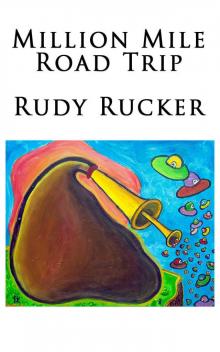 Million Mile Road Trip
Million Mile Road Trip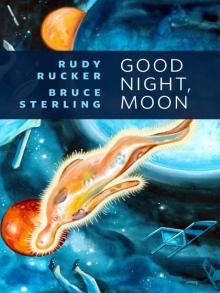 Good Night, Moon
Good Night, Moon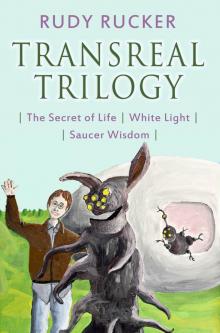 Transreal Trilogy: Secret of Life, White Light, Saucer Wisdom
Transreal Trilogy: Secret of Life, White Light, Saucer Wisdom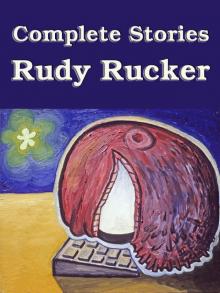 Complete Stories
Complete Stories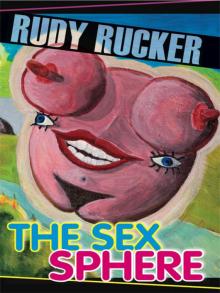 The Sex Sphere
The Sex Sphere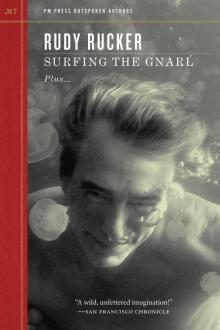 Surfing the Gnarl
Surfing the Gnarl Software
Software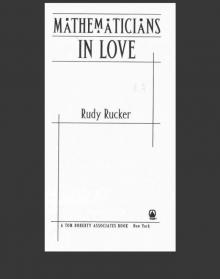 Mathematicians in Love
Mathematicians in Love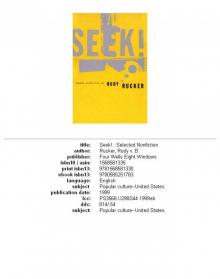 Seek!: Selected Nonfiction
Seek!: Selected Nonfiction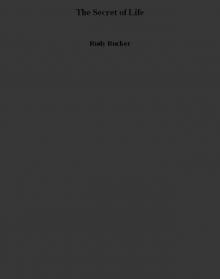 The Secret of Life
The Secret of Life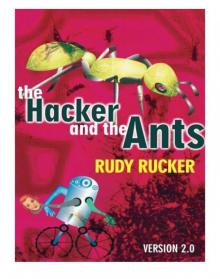 The Hacker and the Ants
The Hacker and the Ants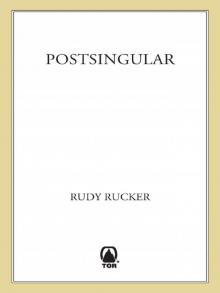 Postsingular
Postsingular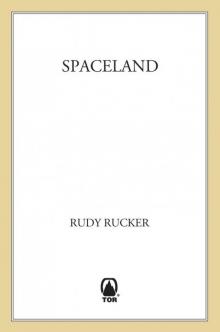 Spaceland
Spaceland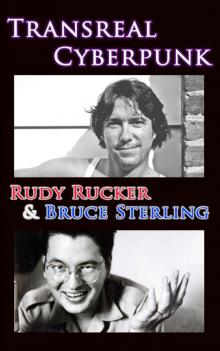 Transreal Cyberpunk
Transreal Cyberpunk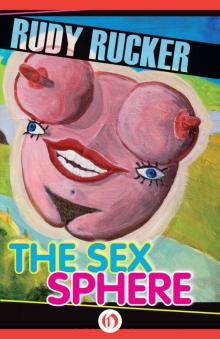 Sex Sphere
Sex Sphere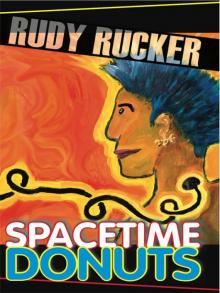 Spacetime Donuts
Spacetime Donuts Freeware
Freeware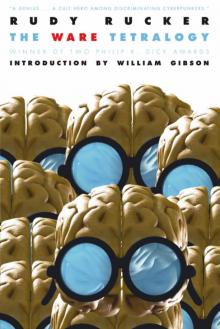 The Ware Tetralogy
The Ware Tetralogy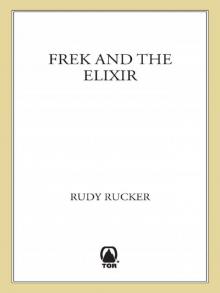 Frek and the Elixir
Frek and the Elixir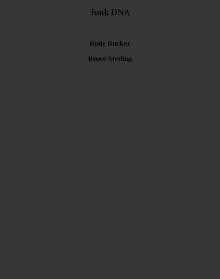 Junk DNA
Junk DNA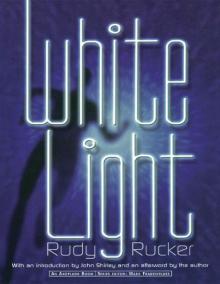 White Light (Axoplasm Books)
White Light (Axoplasm Books)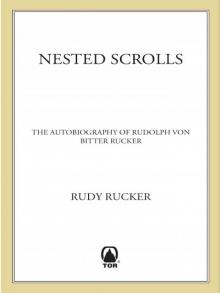 Nested Scrolls
Nested Scrolls Inside Out
Inside Out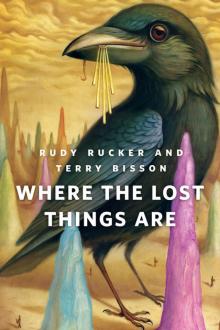 Where the Lost Things Are
Where the Lost Things Are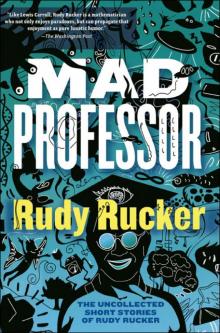 Mad Professor
Mad Professor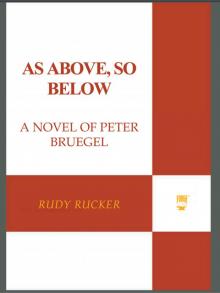 As Above, So Below
As Above, So Below Realware
Realware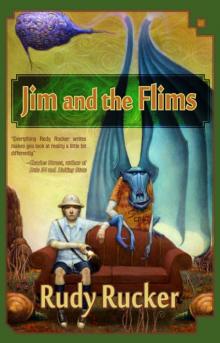 Jim and the Flims
Jim and the Flims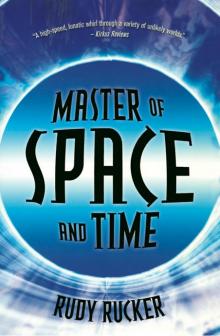 Master of Space and Time
Master of Space and Time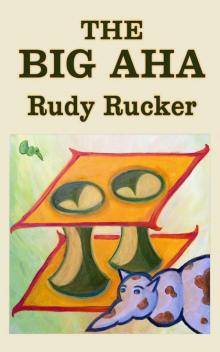 The Big Aha
The Big Aha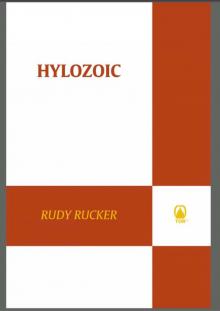 Hylozoic
Hylozoic